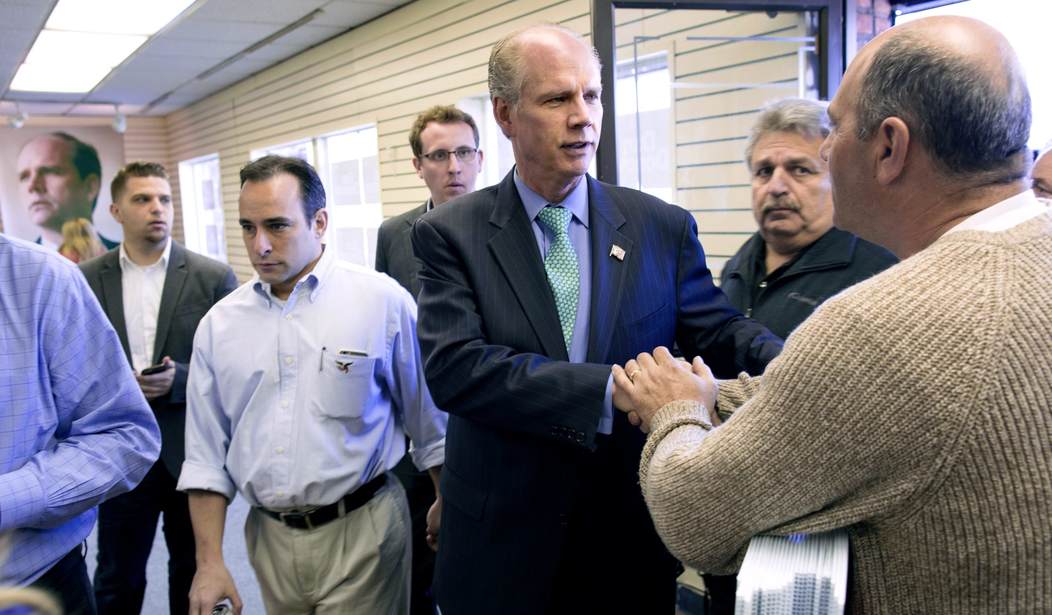WASHINGTON – Rep. Dan Donovan (R-N.Y.) said Congress should pass the Credit for Caring Act as a “standalone” bill rather than wait for a comprehensive tax reform package to move through the House and Senate.
The legislation would amend the Internal Revenue Code to “allow an eligible caregiver a new tax credit for 30 percent of the cost of long-term care expenses that exceed $2,000, up to $3,000 in a taxable year,” according to the Congressional Research Service summary.
Under the bill, “eligible caregiver” is defined as “an individual who pays or incurs expenses for providing care to a spouse or other dependent relative with long-term care needs and who has earned income for the taxable year in excess of $7,500.”
Donovan urged Congress to pass the legislation because helping caregivers should not be viewed as a partisan issue.
“This is just too important to people. I tell my colleagues who may not be as passionate as we all are about this subject, you go to tell AARP you are not for this thing and see what happens to you. Listen, when we were looking for Osama bin Laden I said just wait until he turns 50, AARP will find him,” Donovan said Thursday during a panel discussion sponsored by The Hill newspaper with Rep. Michelle Lujan Grisham (D-N.M.), Sen. Tammy Baldwin (D-Wis.) and Sen. Joni Ernst (R-Iowa). “There are certain things that we have difference of opinions on, but caring for a loved one isn’t one of them.”
Ernst supports the bill because it would help “protect the most vulnerable” in society.
“One thing I value about this piece of legislation is that it is not just helpful for those who are caring for an elderly parent, but there’s also flexibility in that bill for those who are caring for a disabled child, or maybe it is an older parent caring for an intellectually disabled adult child. There are so many applications for this piece of legislation,” Ernst said.
Donovan was asked if President Trump’s “ambitious” agenda of Obamacare repeal and comprehensive tax reform should be the focus for the rest of the year. Donovan said he believes Trump realized early on that more work gets done in the first year of a session of Congress. He said some members of Congress are more afraid to take stances on issues in the second year as they head into re-election campaigns.
“People are either busy with their re-election or some people get paralyzed – afraid to make a decision or take a stance on an issue that might be a little controversial because it might hurt their election. Those folks need to go home,” he said. “I mean, you can’t be down here and be afraid to stand up for what you believe in because of how it’s going to affect you in an election. If that ever happened to me I would go home and just do something else.”
Donovan explained why he was one of the House Republicans who voted against the GOP’s Obamacare replacement plan, the American Health Care Act.
“I thought the replacement plan put forth wasn’t one that helped people that were harmed by the Affordable Care Act without harming people that were helped by it,” he said.
Donovan said the way the Obamacare replacement bill treated seniors was “very disturbing” because it would allow health insurance companies to charge seniors much more than a healthy younger policy holder.
“Right now, the law allows insurance companies to charge a senior three times as much as they charge a young, healthy person. The replacement plan was going to increase that to five times as much at a time when many seniors are living on limited incomes,” he said.
Donovan pointed out that the Affordable Care Act was passed with no Republican votes, and the House’s Obamacare replacement plan was passed with no Democratic votes.
“If we keep doing this on a partisan basis every time the resident of 1600 Pennsylvania Avenue changes we’ll have another healthcare policy for this country – that’s unfair to providers and it’s unfair to patients. You need some stability where people can have some confidence,” he said.
Lujan Grisham argued that the Medicaid cuts in the GOP’s Obamacare replacement plan would hurt individuals and families. She said it “would be wonderful if panels like this” could come together and figure out ways to reform “safety net” programs without reducing benefits.
“If we can get beyond the traditional conversations, which are ‘we’ll cut it’ – all right, what we need to do is strategize how we invest it and how we lift up families,” Lujan Grisham said.
“America needs to think differently about where we are investing, for how long and what those long-term benefits can actually be in this country, and maybe you and I can start that dialogue in the House,” she said to Donovan.
“We started it right here,” Donovan replied.









Join the conversation as a VIP Member